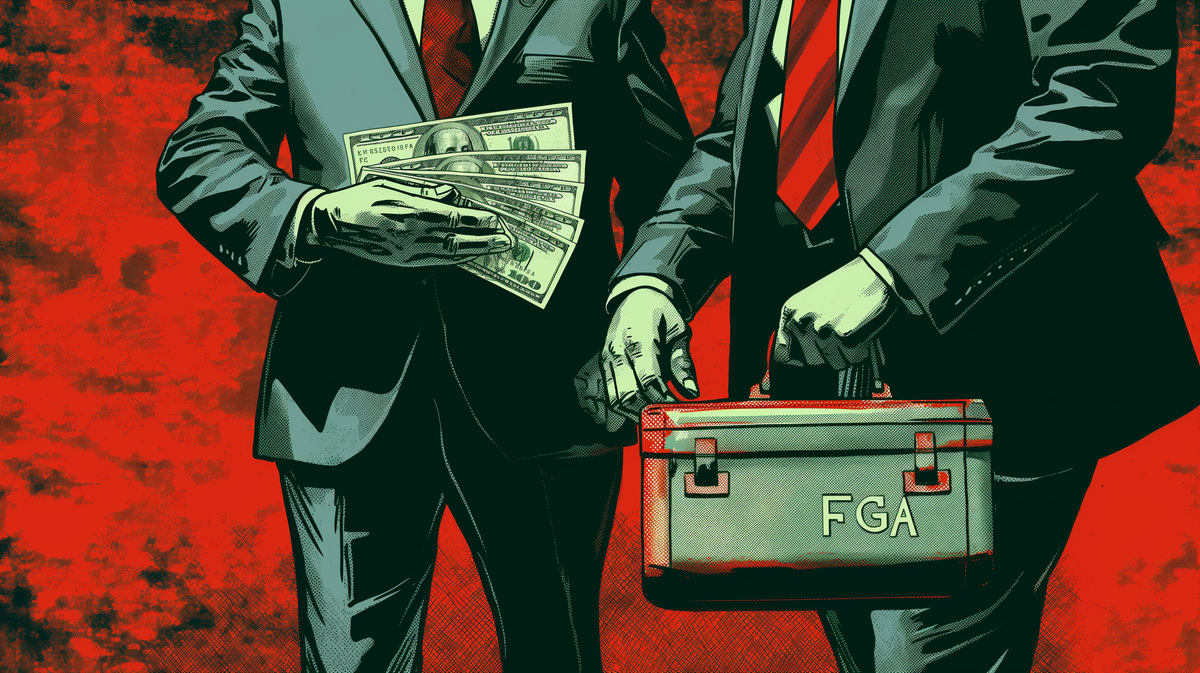The Foundation for Government Accountability - a Florida-based lobbying group backed by the richest 1% - is working to get basic income experiments banned by state legislators across the U.S. (This article is also available as a YouTube video and as a podcast episode) As a well-known quote often

www.scottsantens.com
The Billionaire-Fueled Lobbying Group Behind the State Bills to Ban Basic Income Experiments

Scott Santens
28 FEB 2024 — 16 MIN READ
Image generated by Midjourney v6
The Foundation for Government Accountability - a Florida-based lobbying group backed by the richest 1% - is working to get basic income experiments banned by state legislators across the U.S.
(This article is also available as a YouTube video and as a podcast episode)
As a well-known quote often wrongly attributed to Mahatma Gandhi says, “First they ignore you, then they laugh at you, then they fight you, then you win.” As of 2024, the basic income movement in the United States is now firmly in the "
then they fight you" stage thanks to a slew of bills introduced in state after state that are all attempting to ban the basic income experiments that have spread across the country.
Over 150 guaranteed basic income pilots are now ongoing or recently completed in 24 states as of this writing, and so far, bills in seven states have been introduced to stop them. All of the bills are the result of efforts by the
Foundation for Government Accountability (FGA) - a lobbying group with a billionaire-fueled junk science record every American should know about.
First, to bring every reader up to speed,
basic income (or UBI) is "
a periodic cash payment, unconditionally delivered to all on an individual basis, without means test or work requirement." Although such payments without conditions already exist upon a mountain of evidence, post-2020, experiments have exploded in cities across the U.S. thanks to the efforts of Mayors for Guaranteed Income (MGI) which was founded in 2020 by former Mayor Michael Tubbs after the success of the pilot in
Stockton, CA that provided $500 a month to 125 people for 2 years. The biggest findings there were that
full-time employment grew at twice the rate of the control group, and mental health improved significantly. Yes, despite the common fear that people provided basic income would work less, in Stockton, they worked more, and the mental health impact was comparable to medication.
Since the Stockton pilot ended, there have been dozens of other completed pilots with completed reports, all of which report the same general findings over and over again. Employment does not go down to any worrisome degree, and often actually goes up, with people finding better jobs and better pay, and where wage work is reduced, people invest in schooling or pursue unpaid work or self-employment. With each experiment's results, the case for UBI becomes stronger, and it's clear that
some very wealthy people don't like those results.
In March of 2021 and again in late 2022,
Texas became the first state to attempt to stop more results.
House Bill 4550 in 2021 and then
House Bill 553 in 2022 both included the following wording:
"PROHIBITION ON PROVIDING UNIVERSAL BASIC INCOME. (a) In this section, 'universal basic income' means unconditional cash grants of equal amounts issued on a regular basis to individual residents of a political subdivision. The term includes a basic income, monthly income, or minimum income paid to each individual resident of the political subdivision without regard to the individual ’s circumstances. (b) Notwithstanding any other law, a political subdivision may not adopt or enforce an ordinance, order, or other measure providing for a universal basic income."
Both bills died in committee. In January 2024, a different approach was taken, with a request for the Texas attorney general to
declare such pilots as unconstitutional. It should be noted that as of Feb 2024, there have been seven basic income pilots launched in Texas. One of those that took place in Austin has already published
its results. It found that
a payment of $1,000 a month to 135 people for one year led to 9% of participants working less and 7% working more, and of those who worked less, half upskilled for better future jobs, and half chose unpaid care work. Housing security also significantly increased, as did food security. Participants lived in better housing and ate more balanced meals, and they also felt significantly more connected to the people and places in their neighborhoods. A ban would have prevented these findings.
In April of 2023,
Wisconsin became the next state to attempt to stop more results. At the time, there was a pilot in the city of Madison that wasn't quite done yet, where 155 parents of kids under age 18 got $500 a month for one year. The bill would not have stopped that pilot because it was privately-funded, but the bill was written to stop any future pilots from using any state funds to test "regular periodic cash payments that are unearned and that may be used for any purpose." The bill passed the Wisconsin House and Senate and died by veto by Governor Evers.
In 2024, the anti-UBI bill floodgates opened, starting with
Iowa in January and followed in quick succession by
West Virginia,
South Dakota,
Arizona and
Arkansas in February. All of them introduced bills of their own to stop basic income pilots, all with similar language. At this point, it became clear that a lobbying organization of some kind was behind the bills, something like the
American Legislative Exchange Council that writes bills for legislators to put their names on and pass into law. In my research to discover the group responsible, I found it's the Foundation for Government Accountability, which led down a rabbit hole of dark money and a slew of harmful bills desired by the 1% to reduce their taxes and reduce the power of the 99% to stand in their way.
Who is the FGA?
The Foundation for Government Accountability was founded in Florida in 2011 by Tarren Bragdon after cutting his chops in Maine at the Maine Heritage Policy Center and then as adviser to Maine's governor, LePage. It was in Maine where Bragdon and a cohort of fellow young conservatives gained a reputation for outrageous anti-welfare policies. “I remember them as
a pack of inexperienced, activist right-wingers that went crazy on welfare reform,” said Cynthia Dill, a former state senator to the
Washington Post in 2018. “It galled me that
they had no expertise whatsoever in health and human services but were appointed to places of power by the LePage administration.”
Bragdon's regressive work in Maine was only the beginning for him. He went on to export that work to every state he could and even the federal government too, starting in 2017 when the FGA attempted to expand the work requirements for SNAP to even include parents and limit waivers for states regardless of unemployment rates. The FGA reports now having relationships with
450 policymakers across the country. Bragdon has described FGA's goal as wanting to "return America to a country where entrepreneurship thrives, personal responsibility is rewarded, and paychecks replace welfare checks," and that their approach is "to really tackle one big issue: how to give more Americans
the life-changing power of work, at both the state and federal level.”
At this point, I will remind readers that
universal basic income is quite different than welfare in how it doesn't get pulled away with work, which is why
so many UBI pilots show increased employment for recipients since all wages from work increase their total income, whereas with conditional welfare they can be left barely better off financially, or even worse off. Means-tested welfare creates cliff effects, and cliff effects disincentivize work. I will also mention that if someone's goal is thriving entrepreneurship, it should be considered very intriguing how often
UBI pilots show large increases in entrepreneurship. That is, it should be interesting to those who truly value empirical evidence.
The FGA however is clearly not interested in empirical evidence. One of its first "studies" contributed to Florida Governor Rick Scott's defense of his controversial welfare drug-testing law, requiring benefit recipients to take a drug test as a qualification for benefits. A Bush-appointed federal judge threw out that study as evidence, claiming
it was "not competent expert opinion" and that "even a cursory review of certain assumptions in the pamphlet undermines its conclusions."
Florida's law requiring drug tests for welfare applicants ended up identifying only 2.6% testing positive, significantly lower than the general population's rate of 8.13% in Florida. This directly contradicted justifications for the law, which also proved financially wasteful. Florida spent over $118,000 reimbursing those who tested negative, exceeding any program savings and resulting in a net cost exceeding $45,000.
It cost more to apply the condition than it saved. It should also be noted that studies of
unconditional cash programs tend to show a net reduction in drug use.
In 2016, the FGA touted a study from Kansas of work requirements on SNAP which was panned by both liberal and conservative economists alike for cherry-picking data. “
Work requirements should be based on credible evidence and attention to policy details — the exact opposite of what FGA produces,”
tweeted Peter Germanis, a conservative economist who served in the Reagan and Bush administrations who went on to
tweet, “Tarren Bragdon bases his arguments to support work requirements on the
junk science produced by the FGA –
no serious researcher would accept their claims."
continue reading on site ....






 nothing in life works like that, that mindset is gonna hold UBI off for more decades than it needs to
nothing in life works like that, that mindset is gonna hold UBI off for more decades than it needs to these mfs really stay playing in our faces
these mfs really stay playing in our faces